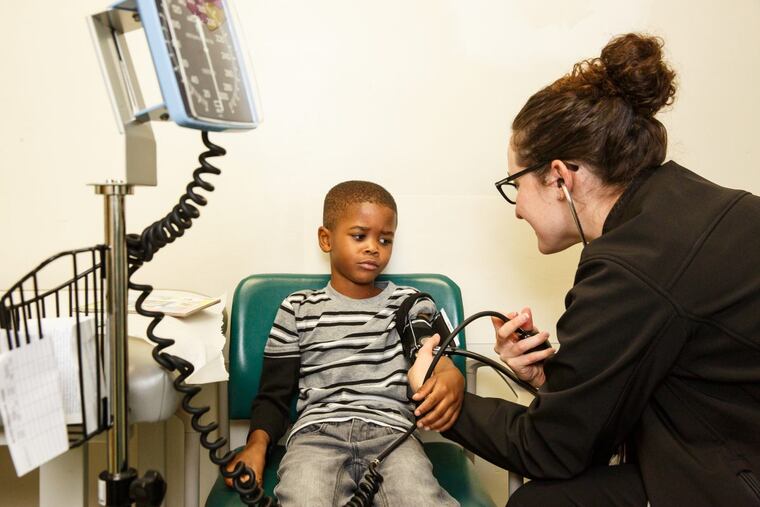Children should not lose health care due to partisan bickering
In September, lawmakers in the House and Senate missed an important deadline to renew funding for the Children's Health Insurance Program (CHIP).

To most families, protecting the health and well-being of their children is a top priority. Unfortunately, Congress is not focused on the same priority right now. In September, lawmakers in the House and Senate missed an important deadline to renew funding for the Children's Health Insurance Program (CHIP).
Instead of focusing on reauthorizing CHIP and stabilizing another lifesaving program, the Affordable Care Act (ACA), Republicans in the Senate have decided to direct their attention to yet another attempt to repeal key elements of the ACA. And Republicans in both chambers are fixated on cutting taxes for the wealthiest at the expense of programs that protect and improve the health of Pennsylvania families.
In ignoring basic health needs, these lawmakers put in jeopardy care for the nearly 9 million children nationwide who depend on CHIP, including 178,707 in Pa. Without reauthorization, Pennsylvania will run out of funds to cover kids on CHIP in February 2018, and families could begin to receive notifications that they'll lose coverage over the holidays.
Thanks to Medicaid, CHIP and the ACA, uninsured rates among kids have reached unprecedented historic lows. More than 95.5 percent of kids in Pa. are currently covered. But political bickering in Congress could wipe out that progress and leave children with few options.
Meet Janice and her daughter Lila from Philadelphia. CHIP has been crucial to their wellbeing during some hard times.
Janice works for a catering business that doesn't offer health insurance, so she buys coverage through the ACA marketplace. Her daughter, Lila, is covered through CHIP. Five years ago, Janice's husband was diagnosed with cancer. Although he had health insurance when he was diagnosed, he later lost his job along with his employer-based insurance, and they struggled to make sure he remained insured. He died two years later.
Through it all, Lila was able to stay covered through CHIP for free, and Janice gained peace of mind knowing that Lila would stay covered no matter what. Although all of Lila's medical care has been routine up to now, she's able to stay up-to-date on her preventative care, access dental coverage, and see the same doctor she's been seeing since she was born thanks to the excellent coverage she receives through CHIP.
Next week, CHIP will celebrate its 25th birthday in Pa. In 1992, five years before Congress created the national CHIP program, Pa. was one of the first states to create a program with bipartisan support to provide comprehensive, affordable coverage for children in low and modest income families. These families made too much to qualify for Medicaid, but not enough to afford the cost of private insurance. In today's dollars, a family of four making less than $77,244 a year can qualify for reduced cost or free CHIP coverage if they don't qualify for Medicaid.
CHIP also provides a more affordable, comprehensive option for higher income families. The same family of four making more than $77,244 can purchase full cost CHIP without financial assistance. This option especially benefits children with special health needs whose parents are self-employed, not offered coverage through an employer, or offered low-quality or high-cost plans through their jobs.
Like Medicaid, CHIP is particularly important for families with special needs children, for children in rural communities, and for children of color. In fact, Medicaid and CHIP cover half of all kids with special health care needs and half of children living in rural areas. CHIP is important to rural, suburban, and urban communities alike.
CHIP is a critical piece of our country's health care infrastructure and an essential lifeline for some of our most vulnerable citizens: children. Lawmakers in Harrisburg seem to recognize this. On Nov. 20, Pa.'s House voted unanimously to reauthorize CHIP on the state level. Pa.'s Senate will vote soon. This is a good time to remind members of the Pa. Senate that a unanimous vote in support of a clean CHIP bill sends a clear and important message.
With reauthorization moving ahead in Harrisburg, a bipartisan agreement to reauthorize funding for the program should be an immediate priority for lawmakers in Washington. Congress, once again, should follow Pa.'s lead and avoid partisan sparring or debates and vote for a clean, straightforward reauthorization. Movement in Congress has been bogged down by proposals to raise Medicare costs on some seniors, or to take money away from other important public health and prevention initiatives.
We should avoid partisan maneuvering and do the right thing. Our kids shouldn't have to wait for politics when it comes to their health care.